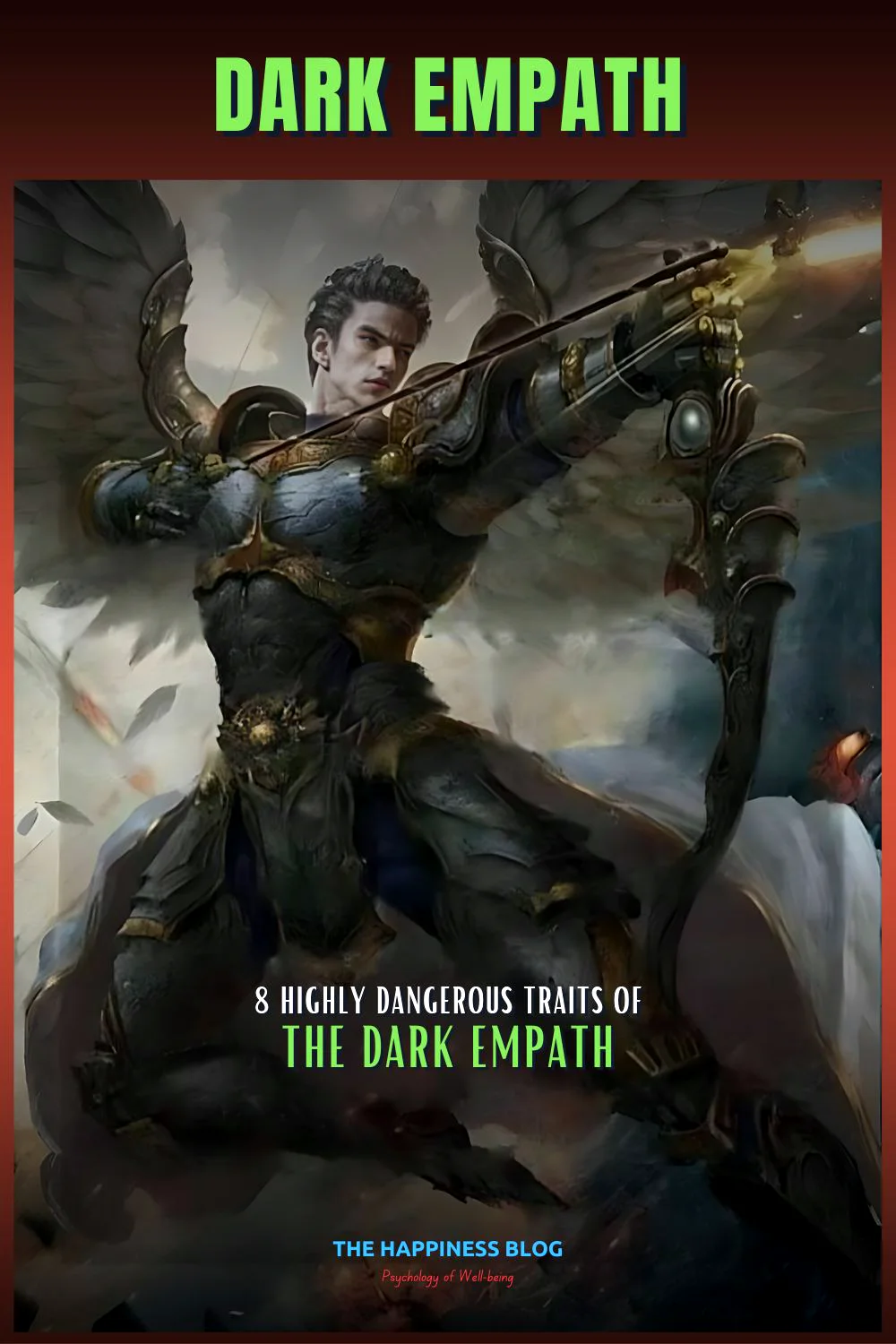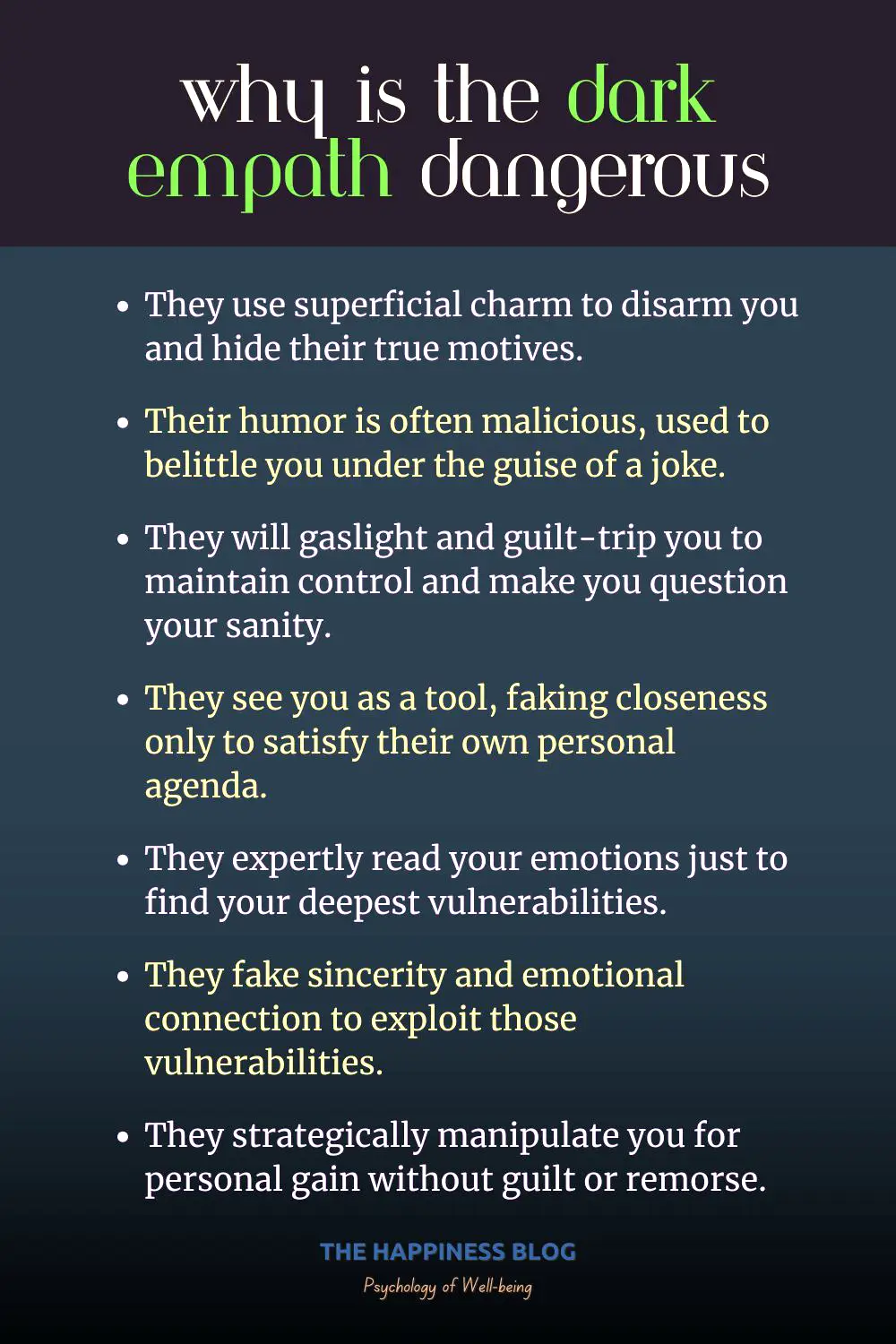Today's Saturday • 10 mins read
This person seems to know you deeply.
- They reflect your emotions without a miss.
- They know exactly what to say when you’re struggling.
- They can empathize with you better than anyone else can.
Then, slowly, you notice the pattern. By then, they have weaponized your vulnerabilities.
The person who seemed so attuned to your feelings is systematically dismantling your sense of reality.
That is what the dark empath is. A personality profile that researchers have only recently begun to map with precision.
What Makes A Dark Empath?
The dark empath personality merges empathy with dark triad traits.
Dark Empath (DE): High Empathy + Dark Traits
The term dark empath emerged from research by Nadja Heym & Fraenze Kibowski in 2020. They found a distinct cluster of traits that set these individuals apart from the traditional “dark triad” personalities (narcissists, Machiavellians, and psychopaths) who lacked empathy.
- More sociable: Dark Empaths are more outgoing and friendly than the classic dark triad type. They are also less aggressive.
- Feel better about themselves: The main difference is that Dark Empaths have better mental well-being and are generally happier than the classic dark triad type.
- Empathy for them is a weapon, not a weakness: Interestingly, having empathy doesn’t make the Dark Empath emotionally fragile or easily hurt. They can understand others’ feelings without becoming vulnerable themselves.
- The “dark” part is still there: The Dark Empath still has a core of meanness or manipulativeness, and can be equally arrogant and insecure as dark triads, even though they seem friendly on the outside.

8 Traits That Make A Dark Empath Highly Dangerous
“A dark empath may actually be more dangerous than a cold and unfeeling dark triad type, because the so-called dark empath can draw you in closer—and do more harm as a result,” says Ramani Durvasula, PhD, clinical psychologist and author of “It’s Not You: How to Identify and Heal from Narcissistic People.”
1. They Map Your Emotions With Precision
The dark empath understands your inner world. They can read your emotional waves the way expert sailors can read the seas.
They notice your micro-expressions, voice inflections, and behavioral patterns that most people miss.
They instantly pick up that slight hesitation before you answer a question. The way you fidget when discussing your mother. Or how your confidence wavers around certain topics.
They can respond so “correctly” to your emotions that you feel safe around them and allow them to get close. And the closer you are to someone, the more they can hurt you. That makes them highly dangerous.
This isn’t the warm, automatic empathy that makes you cry at movies or feel genuine concern for a stranger’s pain.
That is a cold, analytical assessment. They’re building a database of your psychology, cataloging your emotional triggers, insecurities, and desires for future use.
Dark empaths score:
- high on perspective-taking and emotional recognition (cognitive empathy), that is, they understand your feelings and viewpoints, but
- low on empathic concern (affective empathy), that is, they do not emotionally resonate with you or your situation.
2. They Show Strategic Vulnerability
Here’s where dark empaths separate themselves from classic psychopaths: they know when to show weakness.
They’ll share a carefully curated struggle that makes you feel trusted, special, and connected.
This manufactured intimacy serves many functions: it extracts information about how you respond to others’ pain, lowers your defenses, and creates a false sense of mutual vulnerability.
Pay attention to the timing of these revelations. They often come right when you’re questioning the relationship or sensing something off.
The vulnerability feels like proof of authenticity, but it’s actually a retention tactic.
3. They Can Read & Exploit Your Patterns
Dark empaths excel at identifying repetitive dynamics in your life.
The type of person you’re attracted to. How you respond to criticism. Your dispute resolution style.
They absorb these patterns, then position themselves as either the solution to your problems or the catalyst that triggers your most destructive responses.
If you’ve ever felt like someone knew exactly which buttons to push, you’ve experienced this trait in action. They’re not guessing.
They’re working from a blueprint they’ve methodically constructed.

4. They Calibrate Their Affection
The emotional temperature in relationships with dark empaths never quite stabilizes.
They know behavioral psychology well enough to use intermittent reinforcement. That means alternating between warmth and coldness, availability and distance.
It creates a stronger attachment than a steady stream of love and consistent attention.
You’ll experience moments of intense connection that feel profound and real. They probably are real in the moment.
Dark empaths can generate authentic positive emotions when it serves their purposes.
The issue is sustainability and intention. The affection comes with an agenda, and it’s always provisional.
5. They Turn Your Insights Into Weapons
This trait represents the most direct harm dark empaths inflict.
They gather information about your wounds, fears, and shame, often by being the person you feel the safest confiding in. Then deploy that information when it’s most damaging.
The betrayal cuts deeper because the knowledge wasn’t stolen; it was offered.
You disclosed your childhood trauma, your professional anxiety, and even your body image struggles.
Later, in an argument or when you try to establish boundaries, those intimate details get transformed into ammunition.
They are experts at “weaponizing empathy.” Recent research confirmed that a dark empath can effectively use cognitive empathy to understand and evaluate others’ feelings, ultimately to use them for their own benefit (Das & Poovaiah, 2025).
Dark empaths tend to have higher degrees of malicious humor, a term for laughing at someone or some group they think is beneath them.
They also rate higher on guilt induction, or being able to guilt others, commonly known as guilt-tripping. Which is a manipulation move.
6. They Give You Selective Compassion
Dark empaths understand that visible kindness functions as social currency and protective camouflage.
They’re often the person everyone describes as “so caring” or “such a good listener.” They volunteer, mentor, and show up for people in visible ways.
Watch what happens when the compassion stops serving a purpose or when no one’s watching. The warmth evaporates.
The person who spent three hours helping a colleague with a project will mock that same colleague privately.
They know how empathy looks from the outside and can perform it flawlessly. But the performance is about reputation management, not genuine concern.
7. They Control The Narrative, Everytime
Dark empaths position themselves as both protagonist and narrator in shared stories.
They’re skilled at subtle revisionism. It’s not the obvious gaslighting that makes you question obvious facts, but the gentle reshaping of events that shifts responsibility, erases context, or reframes your reactions as disproportionate.
“I was just joking” becomes their shield. “You’re too sensitive” becomes their sword. They excel at making you doubt your own perceptions while seeming reasonable and conciliatory.
Simon Baron-Cohen’s work on cognitive empathy helps explain this: understanding someone’s mental state gives you the blueprint for manipulating their perception of reality. You know which alternate explanations they’ll find plausible.
8. They Build Useful Friendships & Alliances
Dark empaths rarely work alone. They cultivate networks of people who view them favorably.
They recruit their team often by offering people precisely what they need: validation, opportunity, or their own target to criticize.
These alliances serve as both character witnesses and flying monkeys. They will vouch for the dark empath’s character and sometimes unwittingly participate in campaigns against their targets.
If you’ve ever tried to explain someone’s behavior to mutual friends only to be met with confusion or defense of that person, you’ve encountered this trait.
The dark empath has already established a competing narrative, and they’ve done it through relationships where they showed up as generous, supportive, and trustworthy.
Dark Empath vs. Psychopath
Dark Empaths share some features with psychopaths. They have superficial charm, manipulativeness, and an antagonistic core typically associated with psychopathy.
The dark empath has high emotional intelligence (EQ), which psychopaths may have. They can read your unexpressed thoughts and feelings. But because of their “dark” traits, they can use that reading to manipulate you, even if it means hurting you.
However, in contrast to highly psychopathic individuals, dark empaths show lower levels of hostile behavior, have better psychological well-being, and lower risks of having depression and anxiety.
Also, dark empaths may feel guilt. Psychologists note they may experience contrasting emotions due to their empathic abilities, potentially leading to feelings of guilt or anxiety after manipulative actions.
To note, individuals with psychopathic traits or narcissistic personality disorder often lack remorse and emotional depth.
5 Core Traits of A Dark Empath
A Dark Empath personality combines the manipulative and self-serving traits of the classic “Dark Triad” (narcissism, Machiavellianism, and psychopathy) with genuine empathy.
They have the following defining features:
1. A Mix of Dark Traits and High Empathy
They possess an “antagonistic core” but also have high levels of both cognitive empathy (intellectually understanding how someone feels) and affective empathy (sharing in that feeling).
This allows them to accurately read people’s emotions, but they may pair this skill with manipulative intentions or antisocial behaviors.
2. A More Sociable and Agreeable Personality
Dark Empaths are more extroverted, friendly, and cooperative on the surface. This “agreeable” mask makes their manipulative tendencies harder to spot, unlike the classic Dark Triad type.
3. Lower Aggression
Despite their dark traits, they are significantly less aggressive, hostile, and angry than people in the traditional Dark Triad group.
4. Better Psychological Well-being
Their empathy appears to act as a protective factor. Dark Empaths report better mental health, with lower levels of anxiety, depression, and stress compared to the classic Dark Triad personality.
5. Empathy Is A Tool, Not a Vulnerability
Having empathy does not make the Dark Empath emotionally fragile or easily hurt. They can understand and even share others’ feelings without becoming vulnerable themselves, allowing them to maintain control.
Important Considerations
To be fair, recognizing these traits in someone doesn’t automatically mean they are dangerous dark empaths; they may simply be highly emotionally intelligent.
The distinguishing factor is intention and pattern. Dark empaths consistently use their emotional understanding as a tool for manipulation and control, rather than for genuine connection and support.
If you feel someone fits this profile, pay attention to your feelings around them:
- Do you feel increasingly anxious rather than secure?
- Are you editing yourself more over time rather than less?
- Does the relationship leave you feeling confused about your own judgment?
Trust that instinct. The person who truly understands you will use that to support your growth, not to constrain it.
Final Words
So, the dark empath is a more outgoing and happier version of a classic “dark” personality. But they are insidiously harmful because they have empathy, which they can use to manipulate others while protecting their own feelings.
Real empathy creates safety that deepens over time. Dark empathy creates confusion that compounds.
If someone’s understanding of you consistently leaves you feeling smaller, more anxious, or questioning your reality, that might be control dressed in the language of care.
√ Also Read: Gift of Fear: 7 Pre-Signs of Dangerous People
√ Please share this if you found it helpful.
» You deserve happiness! Choosing therapy could be your best decision.
...
• Disclosure: Buying via our links earns us a small commission.
